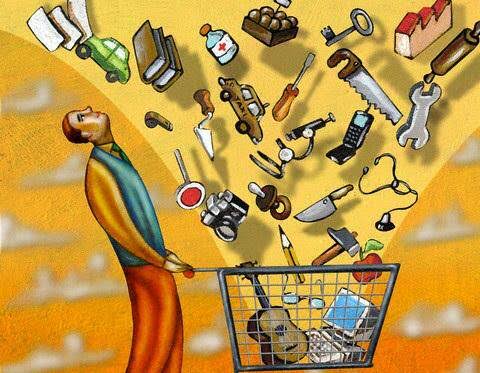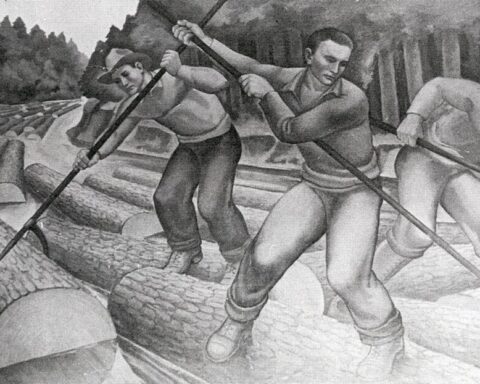Instead of preoccupying our minds with peculiar questions like “How can a Muslim become rich?”, I too have emphasized in many of my writings that we have no alternative but to embrace contentment if we are to defeat the dragon of this wretched capitalist-consumerist society we live in. Brother Mustafa Kutlu takes a more direct path in his book The Voice of the Heart: A Treatise on Migration. He endeavors to explain the economy of contentment through Hududullah (divine limits), the moral order, the fact that wherever “prayer” is mentioned in the Qur’an, “zakat” is also mentioned, and through the mercy of the community. He also settles, in one stroke, the issue of “the role of the state in the economy”—a topic we explored extensively in our articles on kritikbakis.com where we sought to better understand Adam Smith, one of the first Western thinkers to confront capitalism and propose solutions grounded in morality and reason. “The state,” he says, “is an institution established within the framework of Hududullah (divine limits) to uphold justice on Earth; it exists to provide the peace, security, and independence necessary for human beings to worship and serve the Almighty—what we consider to be the very purpose of human existence.”
While reading Mustafa Kutlu’s powerful treatise inviting us to migrate toward an economy of contentment, I kept thinking of E. F. Schumacher’s Small Is Beautiful: A Study of Economics as if People Mattered. In his 1973 book, economist Schumacher explains that the most obvious outcomes of the relentless pursuit of profit and unlimited growth are large-scale organizations and ever-increasing specialization, which in turn lead to the waste of economic resources, environmental pollution, and inhumane working conditions. To escape from this tunnel, whose ending is inevitably disastrous for humanity, he proposes an economy centered not on goods but on human beings, and a conception of capital that serves humanity. Schumacher states: “To the extent that economic thinking is market-based, it erases the sanctity of life, because there can be no sanctity in something that has a price. In this respect, it is not surprising that the economic way of thinking dominates the whole of society; even simple values such as beauty, health, or cleanliness can only survive if they are proven to be economic” (p. 54).
Schumacher’s only hope lies in human discernment. He writes: “Discernment, defined as the mother of all other virtues, cannot convey its full meaning in the words used synonymously today. It actually carries the opposite meaning of a petty, vulgar attitude toward life, turning away from and deeming worthless anything that does not promise immediate use or material benefit. Discernment means the transformation of knowledge of truth into decisions that correspond to reality. So, what could be more important today than reflecting on the virtue of discernment and developing this virtue!… People always ask: What can I really do? The answer is as surprising as it is simple: Each of us can try to put our own house in order. In this endeavor, it is not science and technology—whose value depends entirely on the purpose they serve—that will take our hand and guide us; it is humanity’s traditional wisdom that we seek as our guide” (p. 356).
While reading Brother Mustafa’s The Voice of the Heart: A Treatise on Migration (Kalbin Sesi: Bir Hicret Risalesi), my mind also wandered to the founding theses of the early environmentalist movement—the Greens—and to my own book You Are Without Environment (Çevresizsiniz), which I wrote in 1989 during my youth under the pen name Deniz Gürsel, inspired by them. In that book, I addressed environmental issues, the dangers awaiting us, and the relationship between human beings and nature in Islam. And of course, I thought of Seyyed Hossein Nasr’s magnificent work Man and Nature: The Spiritual Crisis of Modern Man (İnsan ve Tabiat), an unsurpassed cornerstone in this field…
We have been familiar with Max Weber’s analysis of Protestantism, which argues that capitalism—and modernity more broadly—required a revolution in mentality that placed the individual and instrumental reason at the forefront. There is certainly a close link between the Protestant mindset and the emergence of the “new man” and modern production relations. Therefore, a similar revolution in mentality is now necessary. To change and transform capitalism and the consumer society, and to protect nature, we must first change the mentality and the human being. This has been my thesis since You Are Without Environment (Çevresizsiniz). But amid the turmoil of everyday life and politics, we’ve all drifted off course and forgotten our core thesis. With The Voice of the Heart (Kalbin Sesi), Brother Mustafa reminds us once again. Of course, we need both politics and theory—but not to dominate others. Rather, we need them to enrich the lives we live, to deepen our relationship with nature, and to place the functioning of the state on the axis of justice. This must be our core thesis—our main direction.
The Grocery Store of Contentment
Of course there will be consumption—we will meet our needs through the products that emerge from the social division of labor. Naturally, as long as human desires, preferences, and incomes vary, there will be diversity in both products and quality. But no matter how we try to explain it, we cannot account for the greed and avarice that dominate the world we live in, the relentless increase in product variety, and the way all these items are presented to us as if they were indispensable needs. Clearly, we have fallen into capitalism’s trap. We are flailing about in a world where capitalism dictates the course of our lives, yet we try all sorts of ways not to show it. For instance, we wrap ourselves in the cloak of ideological and political fanaticism…
Capitalist companies are portrayed as charitable institutions helping others consume—but it’s like saying the thief who stole your car is doing you a favor by making you walk and thus get exercise (Terry Eagleton)… There are no more heirloom goods; for quite some time now, capitalism’s new production strategy has transformed into “use-and-throw.” Wherever we reach out, we inevitably find an international corporation or brand behind it.
As capitalism developed, Karl Marx’s prediction came true: that commodity exchange would become widespread, human relationships would become reified, and people would become alienated from their labor. But Marx could not have foreseen a world where the system itself would define our needs and where consumption would dictate the rhythm of our lives. Nor could he have known that his followers would abandon his legacy and, instead, align with the bourgeoisie to wage war against states. After all, how could he have known that his own master, Hegel, whom he sought to critique, would declare that the state was merely an instrument of oppression for the ruling classes?
What first appeared to us as a simple spectacle—fashion—turned out to be an attempt to plan our lives, though we failed to see it. We assumed advertising was merely a necessary activity for promoting products; in fact, it was our ticket into the world of consumption, but we didn’t realize it. Marketing was introduced to us as a scientific effort to help us reach the best products—we were deceived. One of our greatest delusions, however, took place in the media sphere, which had ostensibly been structured around the freedom of information. Not only did the media present the news however it wished, but it also became the stage for the “spectacle,” an indispensable element of consumer society. Through fashion, advertising, marketing, and media, the only goal pursued was “consumption—more consumption,” driven by greed and the hunger for profit. Under these circumstances, no matter how many committees or oversight mechanisms we may establish, they all amount to mere window dressing. When “maximum sales” becomes the objective, ethical violations don’t just become likely—they become inevitable.
In the consumer society, what takes precedence is not love, truth, labor, sacrifice, or modesty, but desire and gratification. Consumption transcends its material meaning. Even children—and spirituality itself—are transformed into objects of emotional consumption. A multitude of consumer goods stand before us, supposedly to satisfy our desires, but in fact, they suffocate them…
Not only our consciously identified needs but also the unconscious flow of our desires is becoming commodified. Even what we are supposed to desire is determined by “them.” Thanks to fashion, advertising, marketing, and media, commodities now offer ready-made identity projects. Since the 1960s, lifestyle has been reduced to style ownership. Starting with women, children, and young people, all of us have learned—not just what to wear and how to wear it—but also how to live our lives from the minds that govern consumer society. Homes have begun to transform into the kingdoms of children, whose numbers are steadily declining. From every direction, we hear voices proclaiming, “Your children want this; this is what’s best for your children!”
Today’s society is no longer a disciplinary society made up of factories, mental hospitals, prisons, and clinics; these have been replaced by fitness centers, malls, skyscrapers, banks, airports, and gene laboratories. The obedient subject has been replaced by the performance subject: selfish, hyperactive, anxious individuals who have lost their faith not only in God and the afterlife but even in themselves, elevating their health and bodies to the level of a deity… The inevitable result of all this is the emergence of a performance and burnout society. (Byung-Chul Han)
The madness of consumption affects our spirituality most of all. The virtues it wears down and destroys are contentment, modesty (simplicity), generosity, and ultimately, justice. Yes, I said generosity—you read that right. Because generosity is not wastefulness, and its opposite is not stinginess, but selfishness. Simplicity, on the other hand, stands in opposition to the dominant personality traits of today’s world: narcissism and arrogance. When envy, ambition, greed, and avarice fill our inner world instead of virtues, people who believe they are entitled to everything take center stage. Greedy people feel no gratitude; they are perpetually hungry, always demanding, and entirely unfamiliar with the wisdom of the saying: “The desires of the world are like drinking seawater—the more you drink, the thirstier you become.” Would it make any difference if I told them about the “Grocery Store of Contentment” from my childhood, how it took nearly a thousand years to evolve from a peddler’s stall to a local grocer, and then, within the past fifty years, from there to supermarkets, malls, and the global marketplace?






